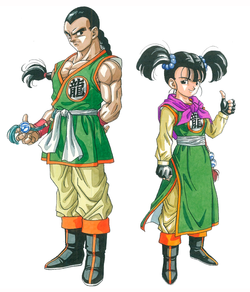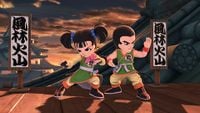Martial Artist: Difference between revisions
(Gender!?) Tag: Mobile edit |
m (→Trivia) |
||
| (6 intermediate revisions by 4 users not shown) | |||
| Line 6: | Line 6: | ||
|firstgame = ''{{iw|wikipedia|Dragon Quest III: The Seeds of Salvation}}'' (1988) | |firstgame = ''{{iw|wikipedia|Dragon Quest III: The Seeds of Salvation}}'' (1988) | ||
|games = ''[[Ultimate]]'' | |games = ''[[Ultimate]]'' | ||
|lastappearance = ''{{iw|wikipedia|Dragon Quest | |lastappearance = ''{{iw|wikipedia|Dragon Quest III HD-2D Remake}}'' (2024) | ||
|console = Nintendo Entertainment System | |console = Nintendo Entertainment System | ||
|species = Human | |species = Human | ||
|gender | |gender = Varies | ||
|creator = [[Yūji Horii]] | |creator = [[Yūji Horii]] | ||
|artist = {{iw|wikipedia|Akira Toriyama}} | |artist = {{iw|wikipedia|Akira Toriyama}} | ||
| Line 19: | Line 19: | ||
==Origin== | ==Origin== | ||
In ''Dragon Quest III'', the idea of a customizable party system was introduced to the series. This system allowed the player to choose what vocations they wanted to help fight alongside them. Among those vocations was the Martial Artist, a class that possesses low magic capability, but compensates with high Strength, Agility, and Resilience. In games such as ''Dragon Quest VII'' and ''Dragon Quest IX'', the player gains the ability to change an established character's vocation, the Martial Artist being one of the basic ones. | In ''Dragon Quest III'', the idea of a customizable party system was introduced to the series. This system allowed the player to choose what vocations they wanted to help fight alongside them. Among those vocations was the Martial Artist, a class that possesses low magic capability, but compensates with high Strength, Agility, and Resilience. In games such as ''{{iw|wikipedia|Dragon Quest VII}}'' and ''{{iw|wikipedia|Dragon Quest IX}}'', the player gains the ability to change an established character's vocation, the Martial Artist being one of the basic ones. | ||
In some games, specific characters fit the archetype of a Martial Artist, such as Jade from ''{{iw|wikipedia|Dragon Quest XI}}'', Alena from ''{{iw|wikipedia|Dragon Quest IV}}'', and Carver from ''{{iw|wikipedia|Dragon Quest VI}}''. Additionally, Martial Artists can be found as NPCs in some of the games. | In some games, specific characters fit the archetype of a Martial Artist, such as Jade from ''{{iw|wikipedia|Dragon Quest XI}}'', {{iw|wikipedia|Alena|Dragon Quest}} from ''{{iw|wikipedia|Dragon Quest IV}}'', and Carver from ''{{iw|wikipedia|Dragon Quest VI}}''. Additionally, Martial Artists can be found as NPCs in some of the games. | ||
==In ''[[Super Smash Bros. Ultimate]]''== | ==In ''[[Super Smash Bros. Ultimate]]''== | ||
| Line 50: | Line 50: | ||
|zh_tw={{rollover|武術家|?|?}}, ''Martial Artist'' | |zh_tw={{rollover|武術家|?|?}}, ''Martial Artist'' | ||
}} | }} | ||
==Trivia== | |||
*Due to the Martial Artist being designed by {{iw|wikipedia|Akira Toriyama}}, his production company Bird Studio is credited for designing the Mii costume. Toriyama is also credited by name in the [[credits]]. | |||
**Production company Armor Project is also credited for the Mii costume. Founder Yuji Horii, creator of ''Dragon Quest'', is also credited by name. | |||
{{Mii costumes (SSBU)}} | {{Mii costumes (SSBU)}} | ||
Latest revision as of 20:54, November 18, 2024
| Martial Artist | |
|---|---|
  Official artwork of the male and female Martial Artists from Dragon Quest III (Super Famicom). | |
| Universe | Dragon Quest |
| Debut | Dragon Quest III: The Seeds of Salvation (1988) |
| Smash Bros. appearances | Ultimate |
| Most recent non-Smash appearance | Dragon Quest III HD-2D Remake (2024) |
| Console/platform of origin | Nintendo Entertainment System |
| Species | Human |
| Gender | Varies |
| Created by | Yūji Horii |
| Designed by | Akira Toriyama |
The Martial Artist (武闘家, Martial Artist), previously known as Fighter, is a class and are reoccurring characters in the Dragon Quest series.
Origin[edit]
In Dragon Quest III, the idea of a customizable party system was introduced to the series. This system allowed the player to choose what vocations they wanted to help fight alongside them. Among those vocations was the Martial Artist, a class that possesses low magic capability, but compensates with high Strength, Agility, and Resilience. In games such as Dragon Quest VII and Dragon Quest IX, the player gains the ability to change an established character's vocation, the Martial Artist being one of the basic ones.
In some games, specific characters fit the archetype of a Martial Artist, such as Jade from Dragon Quest XI, Alena from Dragon Quest IV, and Carver from Dragon Quest VI. Additionally, Martial Artists can be found as NPCs in some of the games.
In Super Smash Bros. Ultimate[edit]
As a costume[edit]

Both the male and female versions of the Martial Artist appear as a DLC Mii Costume for the Mii Brawler, released in the second wave of DLC costumes along with Hero on July 31, 2019. The costumes, as well as the Miis used to showcase them in promotional material, are based on the designs from the class's debut appearance in Dragon Quest III, with some details modeled in particular after the artwork from the game's Super Famicom remake.
Throughout the costume's reveal trailer, both the male and female Martial Artists are seen attacking opponents with moves inspired from other attacks, seen in the franchise. When first showcased, the male Martial Artist uses Counter Throw against Bowser. Later, the female Martial Artist uses down tilt followed by Thrust Uppercut for her up special towards Mario. They are referencing both Leg Sweep and Multifists, two moves appearing for the first time in Dragon Quest VI and obtained by learning the first rank, and by mastering the Martial Artist vocation respectively.
Names in other languages[edit]
Trivia[edit]
- Due to the Martial Artist being designed by Akira Toriyama, his production company Bird Studio is credited for designing the Mii costume. Toriyama is also credited by name in the credits.
- Production company Armor Project is also credited for the Mii costume. Founder Yuji Horii, creator of Dragon Quest, is also credited by name.
|
| |
|---|---|
| Fighter | Hero (SSBU) (XI, III, IV, VIII) |
| Stage | Yggdrasil's Altar |
| Other | Hero (I, II, V, VI, VII, IX, X) · Martial Artist · Mimic · Slime · Veronica |
| Spirits | Spirits |
| Music | Ultimate |